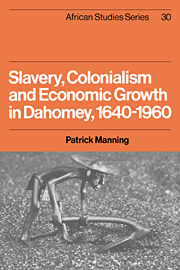Book contents
- Frontmatter
- Contents
- Maps
- Tables
- Figures
- Preface
- 1 Slavery, colonialism and economic growth, 1640–1960
- 2 The Dahomean economy, 1640–1890
- 3 Struggles with the gods: economic life in the 1880s
- 4 Production, 1890–1914
- 5 Demand, 1890–1914
- 6 Exchange, 1890–1914
- 7 The alien state, 1890–1914
- 8 Social struggles for economic ends, 1890–1914
- 9 The mechanism of accumulation
- 10 Capitalism and colonialism, 1915–60
- 11 The Dahomean national movement
- 12 Epilogue
- Notes
- Appendix 1 Export revenue from Dahomey, 1640s–1950s
- Appendix 2 Slave exports by ethnic origin
- Appendix 3 Population loss due to slave exports
- Appendix 4 Foreign trade of Dahomey
- Appendix 5 Foreign trade indices
- Appendix 6 Rainfall
- Appendix 7 Fiscal flows
- Appendix 8 Money supply of colonial Dahomey
- Bibliography
- Index
5 - Demand, 1890–1914
Published online by Cambridge University Press: 26 October 2009
- Frontmatter
- Contents
- Maps
- Tables
- Figures
- Preface
- 1 Slavery, colonialism and economic growth, 1640–1960
- 2 The Dahomean economy, 1640–1890
- 3 Struggles with the gods: economic life in the 1880s
- 4 Production, 1890–1914
- 5 Demand, 1890–1914
- 6 Exchange, 1890–1914
- 7 The alien state, 1890–1914
- 8 Social struggles for economic ends, 1890–1914
- 9 The mechanism of accumulation
- 10 Capitalism and colonialism, 1915–60
- 11 The Dahomean national movement
- 12 Epilogue
- Notes
- Appendix 1 Export revenue from Dahomey, 1640s–1950s
- Appendix 2 Slave exports by ethnic origin
- Appendix 3 Population loss due to slave exports
- Appendix 4 Foreign trade of Dahomey
- Appendix 5 Foreign trade indices
- Appendix 6 Rainfall
- Appendix 7 Fiscal flows
- Appendix 8 Money supply of colonial Dahomey
- Bibliography
- Index
Summary
THE ELEMENTS OF DEMAND
The need for goods and services, backed up by the ability to produce or purchase them, constitutes demand. For early colonial Dahomey, demand may be broken into two basic components: final demand, stemming from the needs and desires of consumers, and intermediate demand, stemming from the input requirements of producers and of the state. While consumer demand was the dominant component, intermediate demand was growing, and it varied according to a different dynamic. The two components of demand are therefore treated separately.
The level of final demand for any good, expressed by individuals or family units, depends in the short run on the purchase price of the good in question, on prices of other goods, on the level of consumer income, and on the relative consumer preference for the good. Yams, for example, were consumed out of home production and were also purchased on the market: whether a family grew its own yams depended not only on how well its members liked yams, but on how well yams grew on their land in comparison with other crops. The purchase of yams in the market, meanwhile, depended on family income, the level of yam production at home, the price of yams on the market, and the price and availability of such substitutes as maize, manioc or rice. While the composition of consuming units ranged widely, from slaves and isolated individuals to great landowning and royal families, the typical consuming unit was a minor lineage composed of from five to twenty persons.
- Type
- Chapter
- Information
- Slavery, Colonialism and Economic Growth in Dahomey, 1640–1960 , pp. 114 - 136Publisher: Cambridge University PressPrint publication year: 1982



